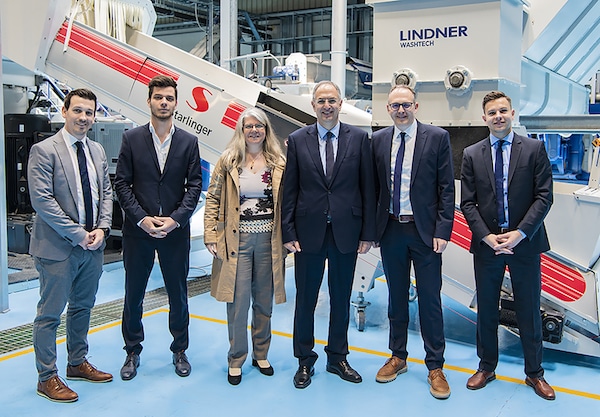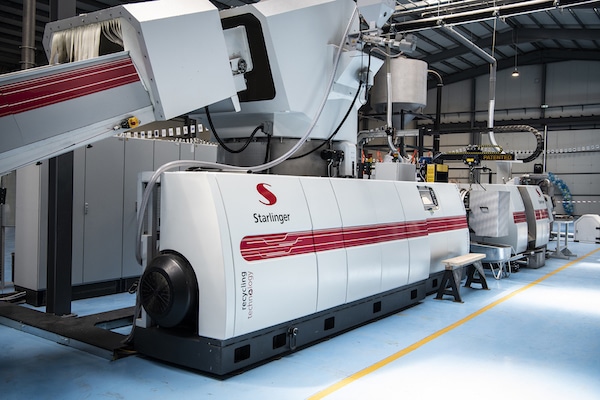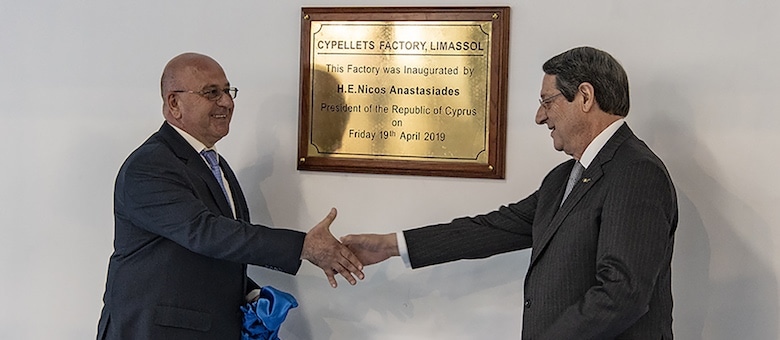Every year, the summer sun, sea, and sand attract growing numbers of tourists to the European island state of Cyprus. In addition to great sales for the tourism industry, they also generate steadily growing mountains of waste. Tourists are clearly not the sole contributors, but according to current figures, Cyprus has the second highest amount of waste per capita in the EU after Denmark.

On 19th April 2019, with most of the government present, the Cypriot president personally inaugurated the country’s first plastics recycling plant in Limassol, underlining the importance of this project for the island. Christos Poullaides, Chairman of PCC, proudly declared: ‘It is a dream come true. More than 10,000 tons of plastic waste can now be converted into plastic pellets in our new facility and will no longer pollute the island’s flora and fauna. Using state-of-the-art technology from Lindner and Starlinger, we can now create high-quality recyclables that reduce the use of primary raw materials and are turned into new products such as film and plastic packaging.’
The new facility is also a big step in the right direction towards EU recycling requirements: ‘This project is extremely important to us. It is only with the help of the private sector that we are able to meet the EU’s stringent circular economy targets and our own environmental objectives,’ said Costas Kadis, Minister of Agriculture, Rural Development and the Environment.
Flexibility is key
The range of applications is vast for what is right now the only turn-key plastics recycling facility on the island. In addition to heavily contaminated post-consumer waste (HDPE and LDPE) from the domestic waste collection, extremely light and high-volume post-industrial film (stretch film) is also processed. ‘We receive source material of varying quality, which is why flexibility was one of the most important criteria when selecting the right technology. The processing system developed by Lindner gives us a clear competitive advantage, as we can produce clean and, above all, high-quality flakes at a consistently high throughput for the downstream extruder. The combination of the Lindner shredder and the perfectly coordinated washing and drying components totally won us over,’ explains Andreas Poullaides, CEO of PCC Waste Management.
Shredding, washing, drying
What sounds simple in theory is only successful if all components are ideally matched. The Lindner shredder Micromat 2000 ensures a homogeneous output with a low fines content, which is decisive for the subsequent cleaning. Diverse components such as the reliable Floater pre-washer and the newly developed friction washer from the Twister series, are combined to create an efficient washing process.

These effectively remove any retained dirt using metered friction and adapting the dwell time of the material. To achieve a completely clean and dry material, which is necessary for the extrusion, a modern drying system is installed downstream of the washing components. The wastewater is cleaned in the fully integrated water treatment facility, which is also supplied by Lindner, and then returned to the process closing the loop. This helps to conserve the island’s water resources.
‘We always develop our systems with our clients’ specifications in mind. The expertise and experience of our project engineers, combined with sophisticated machine technology, are critical for every project and were crucial to the successful implementation at PCC,’ explains Harald Hoffmann, CEO of Lindner Washtech.
From washed plastic waste to high-quality regranulate
The shredded and washed LDPE and HDPE packaging waste is processed on a recoSTAR dynamic 145 C-VAC delivered by Austrian manufacturer Starlinger recycling technology. The line produces approximately one metric ton of regranulate per hour – a capacity frequently requested by film recyclers – and thereby offers PCC an economically attractive solution with an optimal cost-benefit ratio.

Thanks to the tried-and-tested combination of highly efficient C-VAC degassing module and continuous melt filter, the recycling line skilfully masters residual contamination and highly printed material as well as certain residual moisture that the film typically shows after the washing process. ‘Since its introduction at the leading plastics trade show K in 2013, the C-VAC module has rapidly become a door opener in post-consumer recycling’, observes Florian Mitterecker, Regional Sales Manager at Starlinger recycling technology.
Especially in the field of post-consumer waste, the efficient extraction of gases plays a key role, as it ensures the production of high-quality regranulate without air pockets. The collaboration of Starlinger and Lindner Washtech has proven to be highly successful: the two suppliers have already worked on several European projects together from start to finish.



















